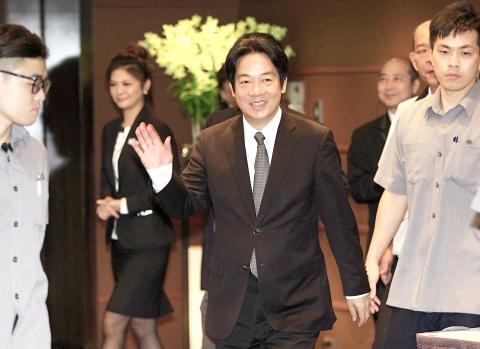The Cabinet has tabled 72 priority bills for the new legislative session, including a draft amendment to the national workweek scheme.
While its top five priorities are the annual government budgets for this year and next, the budget for a two-year river management plan, an amendment to the workweek scheme and a tax reform proposal, the proposal that is attracting the most attention is one to amend the Labor Standards Act (勞動基準法) to establish what the Executive Yuan has called a“safe and flexible work scheme.”
The bill will be the first proposal from the Cabinet on the workweek policy, as changes to the act that were promulgated in December last year were drafted by the Democratic Progressive Party (DPP) caucus, Executive Yuan spokesman Hsu Kuo-yung (徐國勇) said yesterday following a coordination meeting between the Executive Yuan and DPP caucus.

Photo: CNA
DPP lawmakers had suggested that the Cabinet propose its own draft, and Premier William Lai (賴清德) agreed, Hsu said.
“The Executive Yuan must have its own position on such a major bill as the workweek policy. The minutes [of the draft bill] are to be made public after we make a final decision after being questioned by lawmakers during the legislative session,” Lai said earlier in the day on the sideline of a forum on dengue fever prevention.
Lawmakers have already proposed three amendments to modify the workweek regulations by modifying overtime pay rates, annual leave schemes and working hour flexibility, Hsu said.
The Cabinet is not predisposed to any one legislative direction, he said.
The Cabinet has divided the 72 priority bills into eight categories: 14 bills covering economic development, six on “smart country” policies, four on “green” energy policy, five on cultural policies, 23 covering social welfare and transitional justice, 10 on food and drug safety, six on government efficiency and four covering cross-strait relations.
Key draft bills include a proposed amendment to the Referendum Act (公民投票法) to lower the threshold for launching a referendum; draft pension reform bills for the private sector and military personnel; a proposal to relax the Assembly and Parade Act (集會遊行法); one on the Mining Act (礦業法) to tighten mining requirements; a transitional justice promotional act; and an amendment to the Statute for Industrial Innovation (產業創新條例) to resolve shortages of water, power, land, workforce and skilled workers.
A draft cross-strait oversight bill has also been listed as a priority, although it had been a priority bill for the past three legislative sessions, but failed to progress.
There are only 28 plenary sessions during the new session, and the agenda is already crowded with the review of general government budgets, state-run business budgets and other important bills, which will make it a challenge to review the workweek proposals, DPP caucus whip Ker Chien-ming (柯建銘) said.
The new session opens on Friday.

SECURITY: As China is ‘reshaping’ Hong Kong’s population, Taiwan must raise the eligibility threshold for applications from Hong Kongers, Chiu Chui-cheng said When Hong Kong and Macau citizens apply for residency in Taiwan, it would be under a new category that includes a “national security observation period,” Mainland Affairs Council (MAC) Minister Chiu Chui-cheng (邱垂正) said yesterday. President William Lai (賴清德) on March 13 announced 17 strategies to counter China’s aggression toward Taiwan, including incorporating national security considerations into the review process for residency applications from Hong Kong and Macau citizens. The situation in Hong Kong is constantly changing, Chiu said to media yesterday on the sidelines of the Taipei Technology Run hosted by the Taipei Neihu Technology Park Development Association. With

CARROT AND STICK: While unrelenting in its military threats, China attracted nearly 40,000 Taiwanese to over 400 business events last year Nearly 40,000 Taiwanese last year joined industry events in China, such as conferences and trade fairs, supported by the Chinese government, a study showed yesterday, as Beijing ramps up a charm offensive toward Taipei alongside military pressure. China has long taken a carrot-and-stick approach to Taiwan, threatening it with the prospect of military action while reaching out to those it believes are amenable to Beijing’s point of view. Taiwanese security officials are wary of what they see as Beijing’s influence campaigns to sway public opinion after Taipei and Beijing gradually resumed travel links halted by the COVID-19 pandemic, but the scale of

A US Marine Corps regiment equipped with Naval Strike Missiles (NSM) is set to participate in the upcoming Balikatan 25 exercise in the Luzon Strait, marking the system’s first-ever deployment in the Philippines. US and Philippine officials have separately confirmed that the Navy Marine Expeditionary Ship Interdiction System (NMESIS) — the mobile launch platform for the Naval Strike Missile — would take part in the joint exercise. The missiles are being deployed to “a strategic first island chain chokepoint” in the waters between Taiwan proper and the Philippines, US-based Naval News reported. “The Luzon Strait and Bashi Channel represent a critical access

Pope Francis is be laid to rest on Saturday after lying in state for three days in St Peter’s Basilica, where the faithful are expected to flock to pay their respects to history’s first Latin American pontiff. The cardinals met yesterday in the Vatican’s synod hall to chart the next steps before a conclave begins to choose Francis’ successor, as condolences poured in from around the world. According to current norms, the conclave must begin between May 5 and 10. The cardinals set the funeral for Saturday at 10am in St Peter’s Square, to be celebrated by the dean of the College